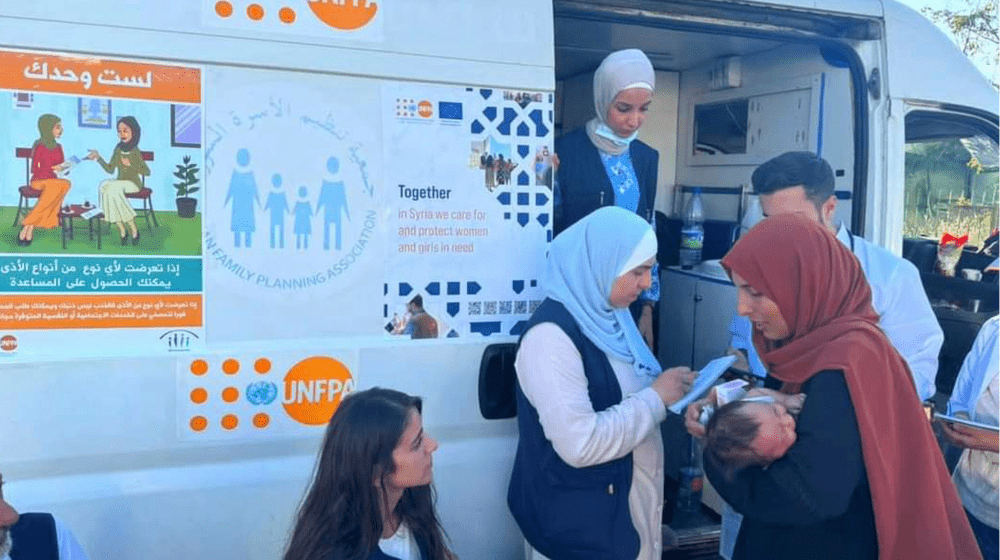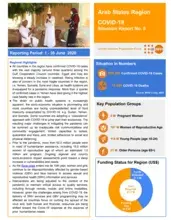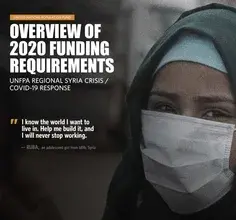2 October 2024 - UNFPA, the UN sexual and reproductive health agency, is gravely concerned for the safety and wellbeing of the 520,000 women and girls who have been affected by the upsurge in conflict in Lebanon since 27 September. Many of those displaced have left everything behind as they flee in search of safety.
As of 2 October, approximately 155,000 people, who have been forced to flee their homes, are seeking refuge in overcrowded shelters at around 875 sites inside Lebanon.
Out of the more than 1 million people affected by this upsurge in violence, according to Lebanese authorities, an estimated 11,600 pregnant women urgently need access to prenatal healthcare, protection, nutrition, clean water and hygiene services. The escalation in hostilities puts the health of pregnant women at risk as they are cut off from their communities and access to care providers.
Attacks on health care have killed health workers and shuttered at least 37 health facilities in Lebanon since 27 September, straining health facilities near displacement settlements. This includes nine UNFPA-supported health care facilities that were providing medical care and counseling for pregnant women and gender-based violence survivors in the Beirut, Mount Lebanon and Bekaa regions.
Laila Baker, Regional Director for Arab States with UNFPA says: “The mounting violence and the displacement of civilians in Lebanon is heart-wrenching. The interruption of essential life-saving health services for women and girls is deeply concerning. The need for protection is urgent. It is a matter of life or death, including for UN staff.”
UNFPA urgently calls upon all parties to uphold their obligations under international humanitarian law and international human rights law to protect all civilians, civilian infrastructure, hospitals, health facilities, medical personnel and patients. Civilians–including aid workers and health workers–are not a target, and safe, unimpeded access for humanitarian supplies is vital. Obstetric supplies that UNFPA has shipped to Lebanon are still stuck in customs and must be released immediately.
Syria
Since 27 September, 128,000 people have crossed the border into Syria, arriving in the governorates of Rural Damascus, Homs and Tartous. Rapid need assessments indicate an urgent need for the full spectrum of emergency assistance, including protection and health services, water sanitation supplies and food. Women and girls' health and protection needs must be central to the humanitarian response.
UNFPA response
In Lebanon UNFPA is:
- Deploying its network of midwives to provide medical care to pregnant women.
- Providing reproductive health kits to healthcare facilities to ensure safe deliveries.
- Giving psychological first aid and case management support to survivors of gender-based violence and raising awareness of the reproductive health and protection services that are available.
- Distributing 10,600 dignity kits to displaced women, girls and host communities.
- Supporting 17 safe spaces for women and girls across Lebanon, including five in Tyre, Bezourieh and Jezzine.
- Supporting 11 primary health care facilities and seven mobile medical units across Lebanon, including three that provide healthcare services within 10 kms of the Blue Line.
In Syria UNFPA is:
- Supporting four mobile units that will provide reproductive health care to newly-arrived women and girls at border points in Rural Damascus, Homs, and Tartus.
- Deploying 19 static facilities to provide reproductive health and protection services in Rural Damascus, Homs, Daraa, and Tartous.
- Distributing life-saving reproductive health medicines and supplies for safe births and obstetric emergencies to health facilities.
- Distributing tens of thousands of dignity kits at border health and protection support points.
- Deploying midwives in these areas to support pregnant and breastfeeding women.
Resources for journalists:
Photos
Stories
Story of Khawla from the Lebanon-Syria border
Khawla, pregnant with her fourth child, and with her three young children in tow, fled bombing in Lebanon for Syria. As she made her way to the Jdeidet Yabbous border, rural Damascus, she began feeling intense pain and then panic as she realized she was going into labour. She crossed the border but could not go any further.
She sought help from a team affiliated with the Syria Family Planning Association, one of UNFPA’s implementing partners, who are currently working at the government border health centre in Jdeidet Yabbous, providing medical care to new arrivals. They had the skills, medical supplies and equipment to assist Khawla to give birth safely.
“I felt that I was going into the unknown. The fear and pressure were overwhelming, and I feared that I would give birth early. Every step felt like a risk to my baby’s health.”
“I was giving birth on the border, surrounded by displaced families who shared the same pain and fear. But when I heard my daughter’s cry, everything stopped. I felt her warmth, and at that moment, all my fears melted away. I felt stronger than ever.”
Khawla named her newborn daughter Amal – meaning hope. After the birth, Khawla and Amal were transported by a Syrian Arab Red Crescent ambulance to a hospital in Damascus. Here the Syria Family Planning Association, in partnership with UNFPA, ensured they received the necessary medical care, tests, and vaccinations. The team also arranged the paperwork for Amal’s birth certificate, a vital document that will allow Khawla and her family to return to their home in Manbij, in Aleppo’s countryside.
Salwa [name changed], Mount Lebanon
Salwa [name changed] fled with her husband, son, and pregnant daughter-in- law from Nabatieh to Mount Lebanon. It took them two days to arrive at the school/shelter in Bchamoun due to the heavy traffic and people on the move. She and her daughter-in-law received dignity kits.
“We left our homes with only the clothes on our backs. The day we left, an airstrike struck our village, killed our neighbours, and destroyed our house. We couldn’t bring anything with us. This is why any help is appreciated. The kits include much-needed supplies such as shampoo, sanitary napkins, and basic hygiene essentials, and we need them all.”
Media contacts
- Eddie Wright (NYC): Tel: +1 917 831 2074; ewright@unfpa.org
- Anastazia Al Hajj (Beirut): Tel +961 3 462 319; alhajj@unfpa.org
- Kinda Katranji (Damascus): Tel +963 935 884 411; Katranji@unfpa.org
- Samir Aldarabi (Cairo): Tel: +20 106 848 4879 aldarabi@unfpa.org
About UNFPA
UNFPA is the United Nations sexual and reproductive health agency. UNFPA's mission is to deliver a world where every pregnancy is wanted, every childbirth is safe and every young person's potential is fulfilled. UNFPA calls for the realization of reproductive rights for all and supports access to a wide range of sexual and reproductive health services, including voluntary family planning, quality maternal health care and comprehensive sexuality education.





